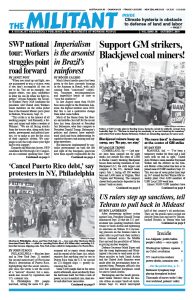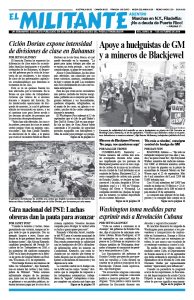FBI on Trial: The Victory of the Socialist Workers Party Suit Against Government Spying is one of Pathfinder’s Books of the Month for October. In July 1973 the Socialist Workers Party and Young Socialist Alliance filed a lawsuit against the FBI — the U.S. rulers’ political police — and other government agencies charging them with decades of illegal spying, harassment and disruption. After a 15-year battle, the SWP and YSA won. This was a victory for the whole working class. The excerpts below are from the introduction by Margaret Jayko. Copyright © 1988 by Pathfinder Press. Reprinted by permission.
BY MARGARET JAYKO
[O]n August 25, 1986, U.S. District Judge Thomas Griesa ruled in favor of the plaintiffs.
The judge found the FBI guilty of violations of the constitutional rights of the SWP and YSA and of their members and supporters. …
An unprecedented victory for constitutional rights had been won.
Judge Griesa’s decision, reprinted in this book, represents a victory for the basic right to engage in political activity free from government interference.
The FBI investigation of the SWP started, wrote Griesa, “with a series of directives issued by President Roosevelt to J. Edgar Hoover, Director of the FBI. Roosevelt met with Hoover on August 24, 1936, and this meeting was recorded in a memorandum written by Hoover. According to the memorandum, Roosevelt ‘was desirous of discussing the question of the subversive activities in the United States, particularly fascism and communism.’ …
“In 1941 Director Hoover wrote the New York office of the FBI complaining about the lack of information regarding the SWP and requesting that every effort be made ‘to obtain from book shops, informants and other sources’ whatever written materials existed about the SWP.” Ever since then, the SWP was a target of the FBI.
Judge Griesa found that “the FBI’s disruption activities, surreptitious entries and use of informants” were “violations of the constitutional rights of the SWP and lacked legislative or regulatory authority.”
The court ruling provides a compelling summary of the government’s illegal operations against the SWP and YSA as revealed in the case. Judge Griesa dealt extensively with the FBI’s use of informers to spy on and seek to disrupt the SWP and YSA.
His decision details several of the fifty-seven disruption operations conducted by the FBI. These include poison-pen letters, malicious articles planted in the press, instances of harassment and victimization, covert attempts to get SWP members fired from their jobs, and efforts to disrupt collaboration between the SWP and Black rights and anti-Vietnam war groups.
It enumerates 20,000 days of wiretaps and 12,000 days of listening “bugs” between 1943 and 1963. It documents 208 FBI burglaries of offices and homes of the SWP and its members, resulting in the theft or photographing of 9,864 private documents.
Judge Griesa concluded that these government operations were illegal and a violation of the Bill of Rights. …
The decision in this case codifies significant advances for political rights. Important new ground has been conquered in extending the right to privacy of political organizations and individual activists. This, more than any other single issue, was at the heart of the case. …
For the first time a federal court has ruled that the very presence of government informers in a political organization is a violation of the constitutional rights of free speech and association and the right to privacy. “The FBI’s use of informants clearly constituted invasion of privacy,” wrote Griesa.
After reviewing the record of more than four decades of FBI spying and disruption, Judge Griesa concluded that “there is no evidence that any FBI informant ever reported an instance of planned or actual espionage, violence, [or] terrorism.” Instead, the informers helped the FBI amass “thousands of reports recording peaceful, lawful activity by the SWP and YSA.” They also carried out FBI orders to “suppress recruiting activities,” to “frustrate the growth of the organizations,” and “to attempt to disrupt them.”
Without the right to conduct their affairs in private, the decision states, the freedom of association of those whose views are opposed by the government is violated. This decision reinforces and extends important previous victories by the civil rights movement and women’s rights struggles in establishing a constitutional right to privacy.
The court decision also recognizes that the government cannot ignore Fourth Amendment protections against arbitrary searches and seizure by justifying measures such as burglaries, “bugs,” and wiretaps on grounds of “national security” interests.
The FBI burglaries were “obvious violations of the Fourth Amendment,” wrote Judge Griesa. “The FBI knew this full well. There was no statutory or regulatory authorization for such operations.”
The decision also marks the first time a federal court has ruled on the constitutional issues posed by covert government disruption operations aimed at fomenting internal divisions and making it more difficult for a political organization to collaborate with others and win new members. …
Judge Griesa ruled, “There can be no doubt that these disruption operations were patently unconstitutional and violated the SWP’s First Amendment rights of free speech and assembly. Moreover, there was no statutory or regulatory authority for the FBI to disrupt the SWP’s lawful political activities.”
Government lawyers argued throughout the course of the suit that the FBI operations were legally justified because of the SWP’s Marxist views and communist activities. This was rejected by the court.
The ruling makes clear that protection of the right to be free from unconstitutional government activities applies to communist organizations such as the SWP and YSA, as well as to noncommunist groups.


